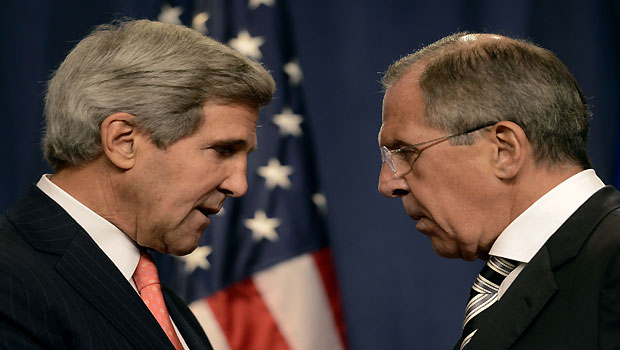With his deal over Syria’s chemical weapons, President Barack Obama has provoked quite a bit of a buzz around his leadership style. His friends talk of a diplomatic coup while his adversaries claim he has committed an error that no other US president would have allowed himself to make.
Both views are open to question.
The Kerry–Lavrov deal may be a diplomatic coup for Moscow, but not for Washington. Vladimir Putin has managed to re-write the Syrian question the way he wanted.
Let’s see what the Syrian problem was about from the start.
It was about the revolt by large numbers of Syrians against a regime that denied them basic human rights. It was also about that regime trying to crush the revolt with indiscriminate massacres. Over the past 30 months, some 100 people have been killed in Syria every day. The Syrian Air Force has bombed dozens of cities and hundreds of villages into rubble.
Such a problem required intervention to stop the massacres and help Syrians find a way towards a new system that guarantees their security, not to mention their basic human rights.
Now Putin has re-written both the problem and the solution.
The problem has become Syria’s arsenal of chemical weapons. The solution has become putting that arsenal under international supervision with a view of de-commissioning it.
The real problem, the regime’s policy of rule by massacre, is forgotten.
The timetable agreed is interesting. Syria has until “the middle of next year,” a vague term in itself, to de-commission its chemical weapons stockpile. That is exactly the time left in Bashar Al-Assad’s presidential term. From the start, Putin had declared it would not allow Assad to be pushed out of office. Now, that is guaranteed by Obama as well. Assad must remain in power to deliver the chemical weapons deal. Shelving his “Assad must go” mantra, Obama implicitly agrees that the despot could even seek another presidential mandate in June 2014. Last Tuesday, Assad even asked the US to give him USD 1 billion to de-commission his deadly arsenal, and to take his chemical weapons to the United States to be destroyed.
All Obama has done is practice the art of solving a subsidiary problem by avoiding the real problem.
However, Obama is not the first to practice that sinister art.
A few examples from recent US history might make the point.
In October 1962, the world was transfixed by the so-called Cuban missile crisis.
This was about the installation in Cuba of Soviet missiles capable of carrying nuclear warheads. The 13-day crisis ended with Moscow agreeing to withdraw the missiles. The stand-off has become part of American mythology, with President John F. Kennedy portrayed as a visionary leader who forced Soviet leader Nikita S. Khrushchev into strategic retreat.
As always, reality was somewhat different.
Moscow had installed the missiles for two reasons.
First, it wanted Washington to guarantee it would no longer try to topple Fidel Castro’s Communist regime. Having failed in the Bay of Pigs fiasco, the CIA was then planning new moves against Castro.
Secondly, Khrushchev wanted Kennedy to dismantle the nuclear-armed Jupiter missiles it had stationed in Turkey on the Soviet border in 1961.
Khrushchev achieved both his goals.
The US made no more moves against Castro, whose regime continues to oppress Cubans to this day.
Kennedy also removed the Jupiters from Turkey.
Over the years, Moscow used Cuba in proxy wars against the US and allies in Latin America, Africa, and even southern Yemen and Oman. Nevertheless, Kennedy was cast as hero, with Marilyn Monroe singing at his birthday and Americans thinking they had won.
The solution to the real problem would have been regime change in Cuba. Kennedy danced around that and sold Americans a bill of goods by tackling the subsidiary problems created by Khrushchev.
The second example concerns attempts by several US presidents, including Jimmy Carter and Ronald Reagan, to solve subsidiary problems in relations with the USSR while dancing around the real problem.
The real problem was that the Soviet Empire regarded Western capitalist democracies as “the enemy” and worked to unite the world under its brand of Communism.
The solution to the real problem would have been regime change.
Instead, successive presidents tackled subsidiary problems, including the Strategic Arms Limitation Talks (SALT) that ultimately led to a couple of treaties, namely the Strategic Arms Reduction Treaty (START). Decades after START started, Russia still has enough nuclear weapons to destroy the world no less than 12 times over—down from 22 times in 1970. To sweeten Moscow to continue the START, Washington subsidized the bankrupt Soviet economy, especially through détente. Henry Kissinger won a reputation as the smartest diplomat since Metternich. What he did, in fact, was to help prolong the life of the “Evil Empire.”
A third example, on a smaller scale, is President Bill Clinton’s “solving” of the Bosnia–Herzegovina problem.
He did that through Richard Holbrooke, who brought the warring factions to Ohio to forge a deal. The Serbs ended up securing all their ill-gained territories, including ethnically cleansed Muslim and Catholic areas within their Serbian Republic. In exchange, they promised “confidence-building talks” within 45 days. Holbrooke wanted a diplomatic coup even if that meant endorsing territorial gains achieved through ethnic cleansing.
Let’s return to Syria. Does the Kerry–Lavrov deal mean that the use of chemical weapons in Syria on 14 occasions is no longer regarded as a war crime? Should one assume that those who commit such crimes no longer face punishment under international law?
Should we nominate the curious quartet of Kerry, Lavrov, Putin and Assad for the Nobel Peace Prize? Obama won it even before he had done anything.
